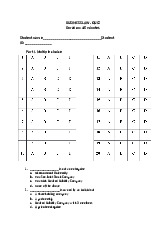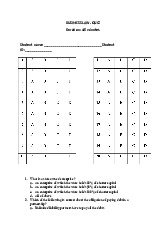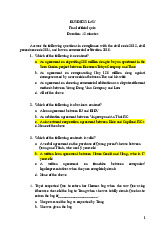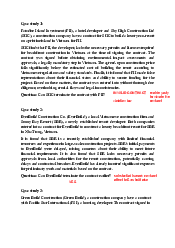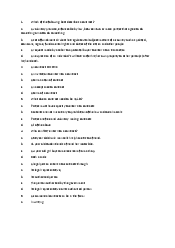








Preview text:
Case
You are expected to have an understanding of the outcome of each of the
cases below, to help you argue the legal principles. In Weeks 1-2 you will be
provided with the legal MAIN CORE principles in the table. From Weeks 3-11,
you are expected to identify these principles YOURSELF in your reading.- Principle Relevant cases
An offer can only exist if there is a firm promise
to do or to refrain from doing something. The
Harvey v Facey-[1893] AC
mere supplying of information, whether in 552
response to a request or otherwise, is not an offer to deal. Pharmaceutical Society of
Great Britain v Boots Cash
A mere display of goods for sale at marked Chemists (Southern)
prices is generally regarded as an invitation to
Ltd-[1953] 1 All ER 482. treat, not an offer.
Fisher v Bell-[1961] 1 QB 394.
Advertisements are usually regarded as Grainger & Son v invitations to treat. Gough-[1896] AC 325
It is possible for a statement not directed to any
Carlill v Carbolic Smoke Ball
specific group of acceptors to be an 'offer to the Company-[1893] 1 QB 256 world at large'.
Mildura Office Equipment &
Offers must set out the means by which it can be
Supplies Pty Ltd v Canon accepted.
Finance Australia Ltd-[2006] VSC 42
Once the acceptor has become aware of the Williams v
offer, it can be accepted and the acceptor’s
Carwardine-(1833) 5 Car &
motive for accepting it is immaterial. P 566
The existence of the offer must be in the
offeree’s mind at the time of purported
R v Clarke-(1927) 40 CLR
acceptance and the 'acceptance' must be both in 227
response to and as a result of the offeree’s knowledge of the offer.
Exaggerated statements that no reasonable
Leonard v Pepsico Inc-88 F
person would believe, known as 'puff', are not Supp 2d (SDNY 1999)
binding on the party making them and do not Principle Relevant cases
give the other party any grounds on which to seek a remedy.
Routledge v Grant, [1828] 4
The offeror’s entitlement to revoke is absolute. Bing 653
Any revocation of an offer must be
communicated to the offeree before it becomes Byrne & Co v Van
effective. Until the offeree becomes aware of the
Tienhoven & Co-(1880) 5
revocation, he or she can accept the offer and CPD 344
any such acceptance will create a valid and binding contract.
Only if the promisee has paid to keep the offer
open or if the promise to keep it open has been
made by deed will the offeror not be able to
Goldsbrough Mort & Co Ltd
withdraw it. This is a new and quite separate
v Quinn-(1910) 10 CLR 674
contractual obligation to keep the offer open called an 'option'.
A counter-offer is a rejection of the original offer
and a substitution of a new offer for it. The Hyde v Wrench-(1840) 2
counter-offer destroys the original offer and, Beav 334
thereafter, it cannot be accepted.
A mere inquiry is not an acceptance, but neither
is it a counter-offer or rejection. It has an entirely
Stevenson v McLean-(1880)
neutral effect on the offer, and when the offeror 5 QBD 346
replies, the offeree still has the option of accepting or rejecting.
Where firms have their own preprinted purchase
order forms and shipping vouchers or delivery
Butler Machine Tool Co Ltd
dockets with terms under which the orders are
v Ex Cell O Corp(England)
sent or received, each set of terms is considered Ltd [1979] 1 WLR 401
a counter-offer and 'the set submitted last' takes precedence.
Where no time limit is stipulated, the offer must
Ramsgate Victoria Hotel v
still be accepted within a 'reasonable time'. Once
Montefiore-(1866) LR 1 Ex
that reasonable time expires, the offer 109 automatically comes to an end.
If you haven't already, make sure to review all assessments-for this unit. Some key things to note:
The three assessments cover material from the themes within the unit.
You are strongly advised to work progressively on all assessments
throughout the teaching period. Participating in the weekly
discussion activities will support you as you prepare for each assessment.
Ensure that you take notes on the cases from each week to help you work
towards the relevant assessment tasks. Cases
You are expected to have an understanding of the outcome of each of the
cases below, to help you argue the legal principles. In weeks 1-2 you will be
provided with the legal principles in the table. From weeks 3-11, you are
expected to identify these principles yourself in your reading.- Principle Relevant cases
In determining what constitutes a reasonable time, at
least two considerations are important: Manchester Diocesan
a. the nature of the subject matter of the Council for Education
contract (and, in particular, whether it was of v Commercial & a wasting nature); and General
b. the means used to communicate the offer Investments, Ltd-[197
(the more urgent the means used, the more 0] 1 WLR 241
reasonable it would be to presume that a rapid reply was required). Brogden v Metropolitan Railway
Acceptance can occur through conduct. Company-(1877) 2 App Cas 666
The offer must be present in the mind of the
“acceptor” when the “acceptance” occurs or there is R v Clarke-(1927) 40
no true acceptance (that is, the act of acceptance CLR 227
must have been in response to, and as a result of, the offer).
An acceptance can only be communicated by the
offeree or by an agent-duly appointed for that purpose. Powell v Lee-(1908)
Until the offeror becomes aware of the-acceptance, the 99 LT 284 acceptor is not bound. Felthouse v
The offeror cannot stipulate that silence (such as not Bindley-(1862) 11
actively declining the offer) is a means of acceptance. CBNS 869
The postal rule states that where the parties Adams v
contemplate acceptance by mail, acceptance will be Lindsell-(1818) 106
complete as soon as the letter is properly posted. ER 250
The postal rule specifically applies to acceptances by Entores Ltd v Myles Principle Relevant cases
mail and by telegram. For other forms of
communication, the general rule applies and
acceptance occurs when and where the offeror Far East
receives the communication. This includes Corporation-[1955] 2
acceptances by telephone, telex, teleprinter, facsimile QB 327
machine and other forms of instantaneous or near- instantaneous communication. Household Fire and
Where the postal rule or a “deemed acceptance” Carriage Accident
provision applies, a posted acceptance will be Insurance Co v
effective, even if it becomes lost, is never delivered or Grant-(1879) 4 Ex D is abnormally delayed. 216
The offeror can negate the postal rule by requiring
actual communication instead of the constructive Holwell Securities Ltd
communication, either by expressly stipulating that v Hughes-[1974] 1 All
they must receive the acceptance for it to become ER 161
effective or by implication where it's clear that
uncommunicated acceptance was not intended. Coward v Motor
If money is contributed as part of expense sharing, Insurers
there is still no contract unless there is evidence of Bureau-[1963] 1 QB
intention to create a legally binding contract. 259
Agreements between spouses are not contracts Links to an external
because the parties did not intend that they should be site.Balfour v
attended by legal consequences.-Domestic Balfour-[1919] 2 KB
agreements between spouses are outside the realm of 571 contract altogether.-
It is possible for a spouses to create a binding Merritt v
contract, for example as part of a separation Merritt-[1970] 2 All ER arrangement. 760
Where adult members of a family other than husband Riches v
and wife share a household, the financial Hogben-(1986) 1 Qd
arrangements which they make may be intended to R 315 have contractual effect. Principle Relevant cases Ermogenous v Greek
In commercial agreements, it is presumed the parties Orthodox
intend to create legal relations. However, if the parties Community(2002)
expressly deny intention by stating that negotiations 209 CLR 95
are ‘subject to contract’ or that any agreement is to be Rose & Frank Co v
‘binding in honour only’ then there is no contract. Crompton Bros-[1923] 2 KB 261
An agreement between persons who share a Simpkins v
household, but which has nothing to do with the Pays-[1955] 1 WLR
management of the household, will probably be 975
intended to be legally binding.
If the act put forward as consideration was performed Eastwood v
before any promise of reward was made, it is not valid Kenyon-(1840) 113 consideration. ER 482
As long as some value is given, consideration need not Thomas v
be ‘adequate’ (that is, be of equal or greater value to Thomas-(1842) 3 QB
the promise). There is no remedy for someone who 234 makes a bad bargain.
Forbearance (a promise not to do something that the Dunton v
promisee was entitled to do or not exercising a present Dunton-(1892) 18 VLR
right at the request of the promisor) can constitute 114 good consideration. Cases
You are expected to have an understanding of the outcome of each of the
cases below, to help you argue the legal principles. In Weeks 3-11, you are
expected to identify the legal principles that these cases relate to in your
reading and complete the table for your study notes as modelled in weeks 1- 2.- Relevant Textbook Principle cases section Mercantile Bank of Sydney v 4.3 Taylor-(1891) 12 LR (NSW) 252 Van Den Esschert v 4.8 Chappell-[196 0] WAR 114 De Lassalle v Guildford-[19 4.14 01] 2 KB 215 Hoyts Pty Ltd v Spencer-(191 4.15 9) 27 CLR 133 JJ Savage & Sons v Blakney-(197 4.17 0) 44 ALJR 123 http://www.e-l awresources.co. Routledge v uk/Routledge-v- McKay-[1954] Mackay.php Link 1 All ER 855 s to an external site. Oscar Chess 4.12 v Relevant Textbook Principle cases section Williams - [195 7] 1 All ER 325 [PDF, 17KB] Dick Bentley Productions Pty Ltd v Harold Smith 4.12 (Motors) Pty Ltd, [1965] 1 WLR 623 Ellul v Oakes, [1972] 4.12 3 SASR 337 BP Refinery (Westernport ) Pty Ltd v Shire of 4.34 Hastings-(197 7) 180 CLR 266 L’Estrange v Graucob - [193 4] 2 KB 4.28 394 - Links to an external site. Toll (FGCT) http://classic.au Pty Ltd v stlii.edu.au/au/jo Alphapharm urnals/UNELawJ Pty l/2005/9.pdf Lin Ltd-[2004] ks to an external HCA 52 site. Curtis v 4.29 Chemical Cleaning and Dyeing Co - [1951] 1 KB 805 - Links Relevant Textbook Principle cases section to an external site.(Clarke 2010) Clarke, B., Kapnoullas, S.,-When is a signed document contractual? Le Mans Taking the 'Fun' Grand Prix out of Circuits Pty 'Funfair'-[2001] Ltd v QUTLawJJI 4
Iliadis-[1998] (http://classic.aust 4 VR 649 lii.edu.au/au/journ als /QUTLawJJl/2001/ 4.htm Links to an ext ernal site.)
Class Session Discussion
